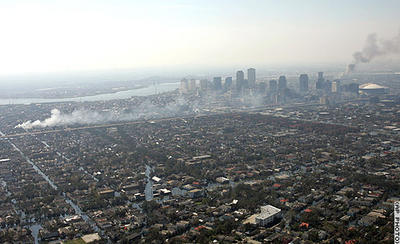Washington Post: Early Warning:
Liberally Ignorant Blog
After reading the blog "The Pressure Cooker at Homeland Security" (Early Warning) by William Arkin posted on 19 September 2005 at 0730 ET (The Washington Post: Online Edition), I am convinced their (web) editors are either:
a.) Out to lunch
b.) Are not doing their jobs
c.) Want to compete with "The Enquirer" for sensationalism
d.) Don’t care
e.) Don’t know; don't bother to check the "facts"
f.) All of the above
Based on Mr. Arkin's purported background (i.e., a former Army intelligence analyst and consultant"), I cannot fathom his general ignorance, either intentional or unintentional, of rudimentary chemistry and/or physics. Here are a couple links about pressure cookers, one written by a high school kid doing a science project:
How to use a pressure cooker!
Boiling Oil Bomb
Fertilizer Pressure Cooker Bombs
If you do a search on pressure cooker bombs, you will find many well documented incidents of people making and using pressure cooker bombs. These bombs are a step, a large step, up from the dry ice "bombs" we used to make in the lab as a joke to wake sleeping coworkers up.
NOTE: Do not try this as it is a health hazard, particularly in large volumes!
The Washington Post is quickly becoming more and more like those flashy tabloids at the checkout stands. I'll bet Catherine Graham is turning in her grave! I wish I could say something redeeming about Mr. Arkin; but, alas, I must say somewhere down the line the taxpayers wasted their money educating and employing him.
Everyone complains about how disorganized the FEMA response was to Hurricane Katrina and they complain about how much money taxpayers pay to explore such situations (e.g., terrorists, natural disasters, etc...). As the old saying goes, "You can't have your cake and eat it too!"
If people took time to assess and understand what is going on, they would realize that there was a breakdown in communication, a breakdown in the process, having the information but not knowing what to do with it, and, admittedly, poor choices made in appointments, organizations and planning, or lack thereof. There is a commercial that goes something like this, "I don't even know enough to know I don't know." If we knew everything, we wouldn't need these reports Mr. Arkin mentions, much less people to do them. No one has all the answers, not even Mr. Arkin.
Lastly, Mr. Arkin may think he's raising awareness, but he's just spreading his ignorance, his narrow-mindedness, backing his writing up with subjectivity instead of cold hard facts, instead of supporting his contentions with empirical data. He's playing the blame game, with little or no intention of proposing, much less finding, any resolutions/solutions to current security issues
"There are just so many warnings about so many areas covering so much of the day-to-day life of
That's exactly what the terrorists are counting on. Way to go Mr. Arkin!


 <---9/11
<---9/11 




